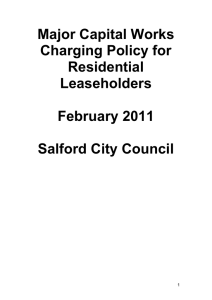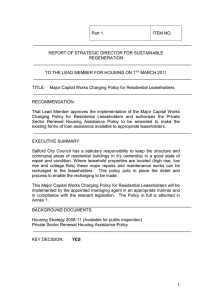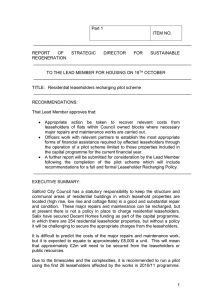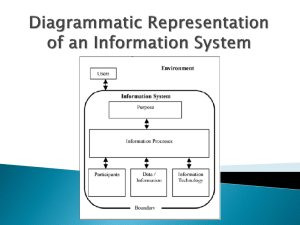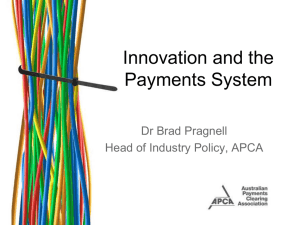Leaseholder decant plan for residents of 1
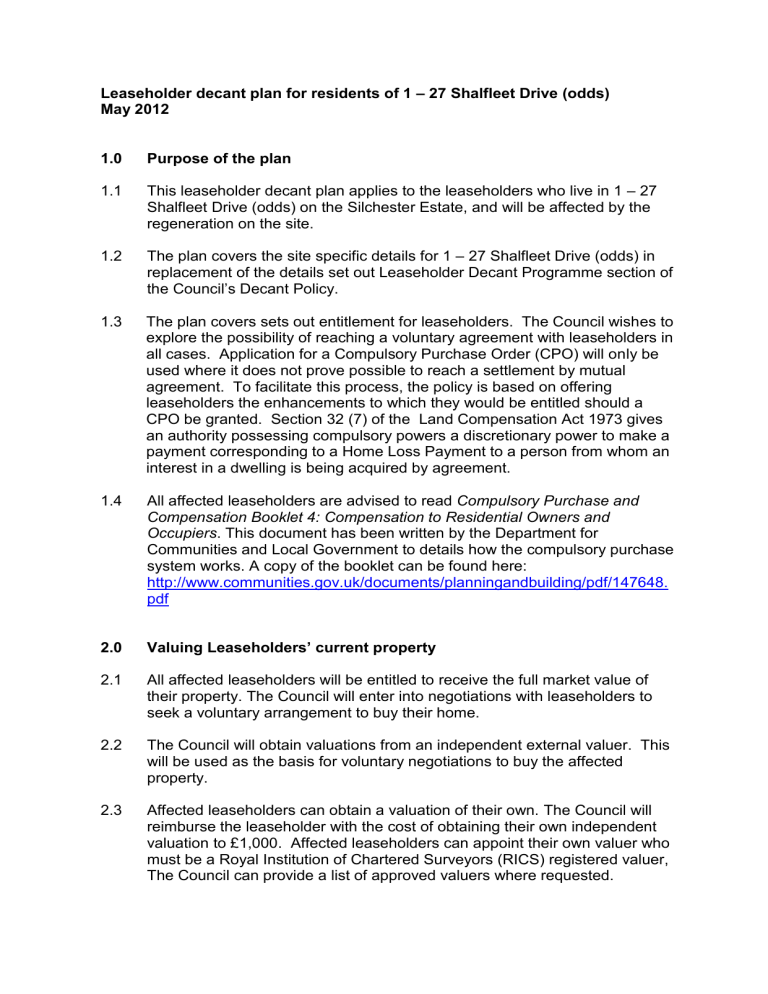
Leaseholder decant plan for residents of 1
– 27 Shalfleet Drive (odds)
May 2012
1.0 Purpose of the plan
1.1 This leaseholder decant plan applies to the leaseholders who live in 1
– 27
Shalfleet Drive (odds) on the Silchester Estate, and will be affected by the regeneration on the site.
1.2 The plan covers the site specific details for 1
– 27 Shalfleet Drive (odds) in replacement of the details set out Leaseholder Decant Programme section of the Council’s Decant Policy.
1.3 The plan covers sets out entitlement for leaseholders. The Council wishes to explore the possibility of reaching a voluntary agreement with leaseholders in all cases. Application for a Compulsory Purchase Order (CPO) will only be used where it does not prove possible to reach a settlement by mutual agreement. To facilitate this process, the policy is based on offering leaseholders the enhancements to which they would be entitled should a
CPO be granted. Section 32 (7) of the Land Compensation Act 1973 gives an authority possessing compulsory powers a discretionary power to make a payment corresponding to a Home Loss Payment to a person from whom an interest in a dwelling is being acquired by agreement.
1.4 All affected leaseholders are advised to read Compulsory Purchase and
Compensation Booklet 4: Compensation to Residential Owners and
Occupiers . This document has been written by the Department for
Communities and Local Government to details how the compulsory purchase system works. A copy of the booklet can be found here: http://www.communities.gov.uk/documents/planningandbuilding/pdf/147648.
2.0 Valuing Leaseholders’ current property
2.1 All affected leaseholders will be entitled to receive the full market value of their property. The Council will enter into negotiations with leaseholders to seek a voluntary arrangement to buy their home.
2.2 The Council will obtain valuations from an independent external valuer. This will be used as the basis for voluntary negotiations to buy the affected property.
2.3 Affected leaseholders can obtain a valuation of their own. The Council will reimburse the leaseholder with the cost of obtaining their own independent valuation to £1,000. Affected leaseholders can appoint their own valuer who must be a Royal Institution of Chartered Surveyors (RICS) registered valuer,
The Council can provide a list of approved valuers where requested.
3.0 Home Loss Payments
3.1 Affected leaseholders will receive full market value plus any Home Loss
Payment and Disturbance Payment to which they may be entitled (as detailed below).
3.2
Home Loss Payments for resident leaseholders
3.2.1 Resident leaseholders who have lived in the dwelling as their only or main residence for a period of not less than one year ending with the date of completion of purchase by the Council are entitled to a Home Loss Payment as set out in the Land Compensation Act 1973. This entitlement arises only for those who have a right to occupy the property through a freehold or leasehold interest in the property. In the case of a leasehold property, there must be at least three years unexpired term on the lease.
3.2.2 The entitlement is to 10 per cent of the market value of the property, subject to a maximum payment of £47,000 and a minimum payment of £4,700.
3.2.3 Given the thresholds are subject to change annually by the Secretary of
State, the levels of payment will be the appropriate statutory amount at the date of sale.
3.3 Home Loss Payments for non-resident leaseholders
3.3.1 Non- resident leaseholders are entitled to a Basic Loss Payment as set out in the Land Compensation Act 1973, sections 33A to 33K. This entitlement arises only for those who have the relevant interest in the land through a freehold or tenants’ (leasehold) interest in the property.
3.3.2 The entitlement is to the lesser of 7.5 per cent of the value of the property or
£75,000.
4.0 Disturbance Payments
4.1 Disturbance Payments for resident leaseholder
4.1.1 A resident leaseholder is defined as a leaseholder who has been resident at the address for 12 months prior to the date of eligibility.
4.1.2 The Council will give consideration to reimbursement to resident leaseholders of the costs incurred through the following:
removal expenses;
special adaptation of the replacement premises;
altering soft furnishings and moveable fittings and fixtures to fit your new home;
disconnection and reconnection of services eg telephone, electricity, gas etc;
forwarding of post for three months;
incidental costs of acquiring replacement property.
4.1.3 Every loss will be considered on its merits and should be recoverable if a natural, direct and reasonable consequence of being disturbed. The onus is on the leaseholder to justify his or her claim and will be required to produce proof of the expense incurred.
4.4.4 Should the leaseholder not wish to submit an itemised claim, they can be offered a lump sum of £3,000 in full and final settlement of their claim.
4.2 Disturbance Payments for non-resident leaseholder
4.2.1 Non-resident leaseholders may be entitled to reimbursement of reasonable costs in acquiring an interest in other land. The Council will consider the payment of these incidental charges or expenses incurred in acquiring an interest in other land in the United Kingdom. This entitlement will arise for a one year period commencing on the date of completion of the purchase of the leaseholders existing property by the Council.
4.2.2 Entitlement to such payments will be assessed in line with what would be a reasonable entitlement if a CPO had been in place at the time of purchase.
4.2.3 The Council will reimburse leaseholders for reasonable legal costs incurred in the sale of the property and purchase of a replacement property up to the amount that would be payable if the purchase price of the new property was equivalent to the market value of the existing property. This includes:
4.2.3.1 The reasonable cost of legal fees involved in the selling the leasehold property which the Council wishes to purchase, including VAT, up to a maximum amount of £1,500.
4.2.3.2 The reasonable cost of legal fees to purchase an equivalent home, including
VAT, Stamp duty land tax, land registry fees, local and other search fees up to a maximum amount of £5,000.
4.2.3.3 The reasonable cost of surveyors’ fees incurred in connection with the purchase of an equivalent property up to a maximum amount of £600.
4.2.3.4 The reasonable costs associated with transfers of an existing mortgage to a new home, including any survey costs, up to a maximum amount of £1,000.
4.2.4 Itemised invoices for each of the above costs must be produced before payments can be authorised.
5. Voluntary negotiations and Compulsory Purchase Orders
5.1 A voluntary agreement will be sought to acquire the property, with vacant possession. However if this cannot be obtained, a Compulsory Purchase
Order (CPO) can be applied for under Section 226 of the Town and Country
Planning Act 1990, as detailed in sect ion 6.3 of the Council’s Decant Policy.
